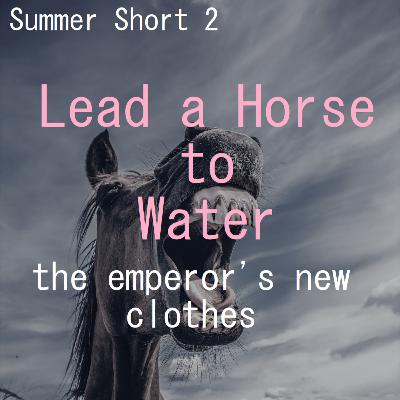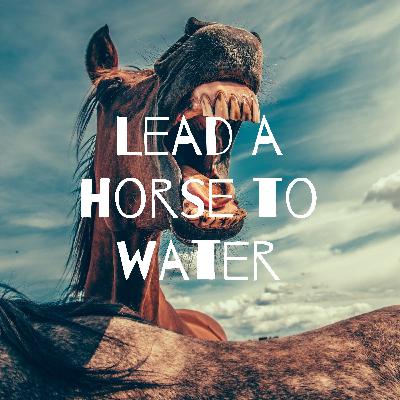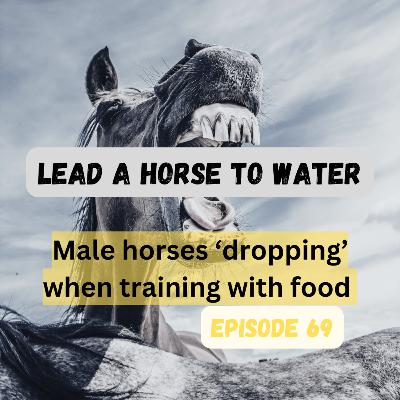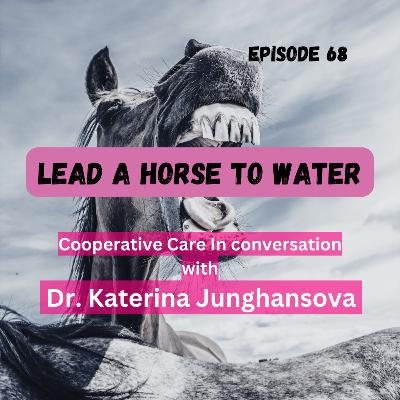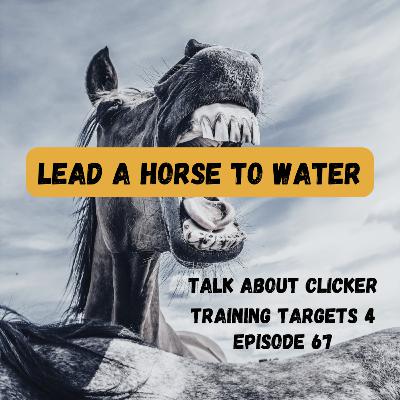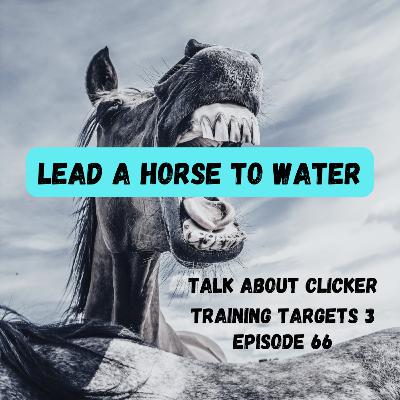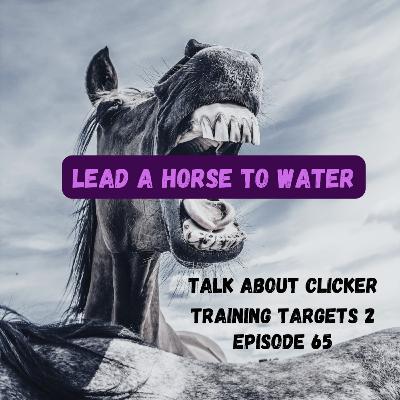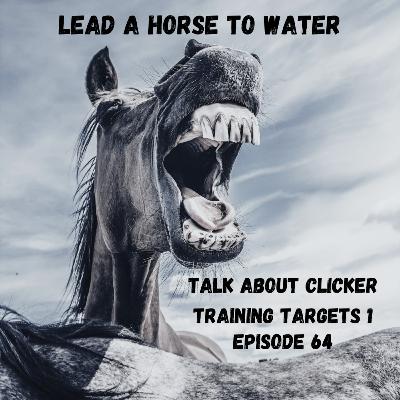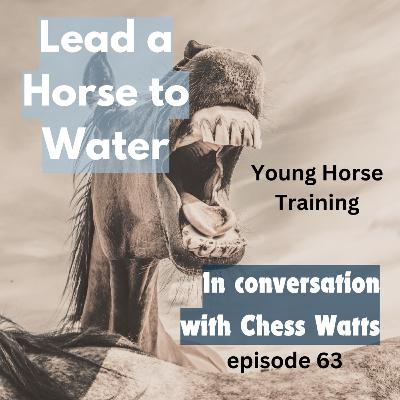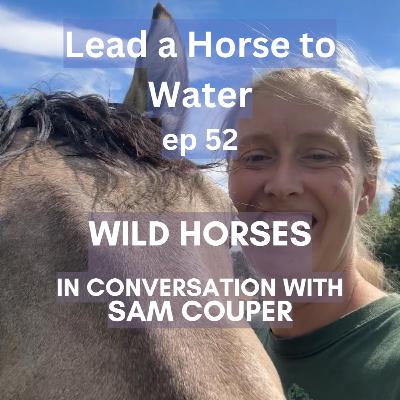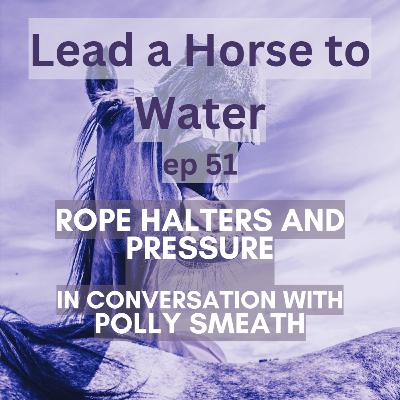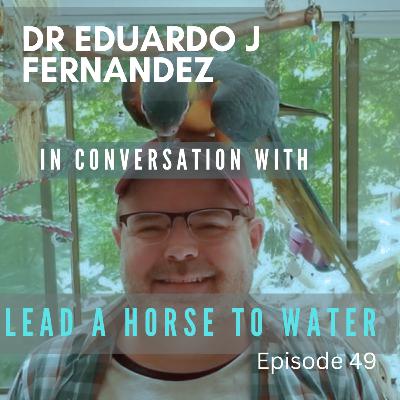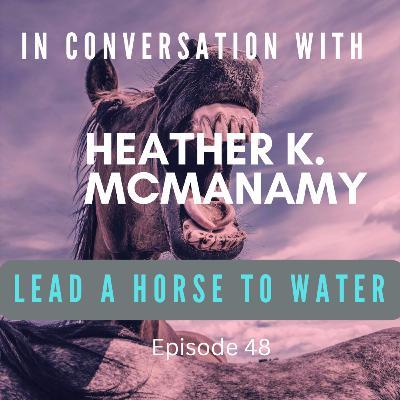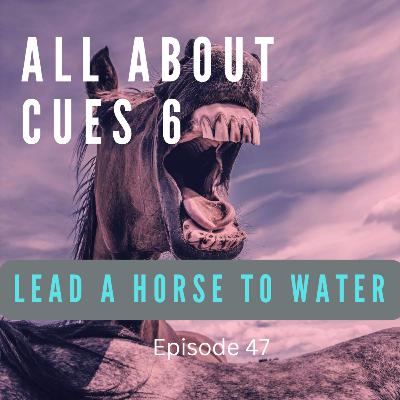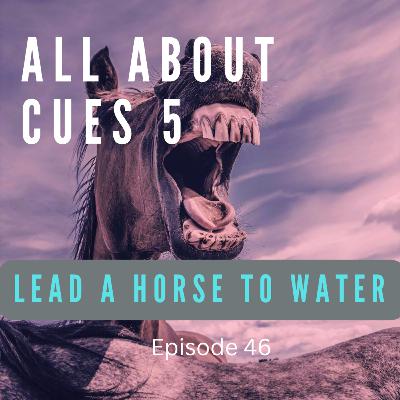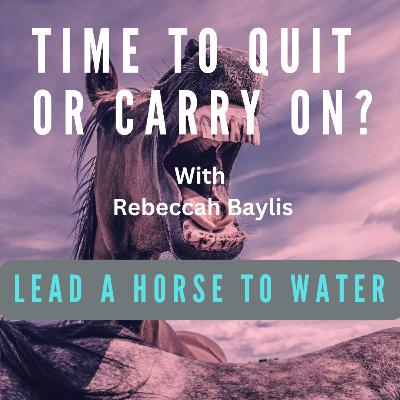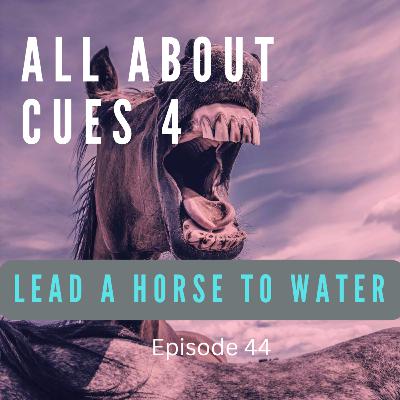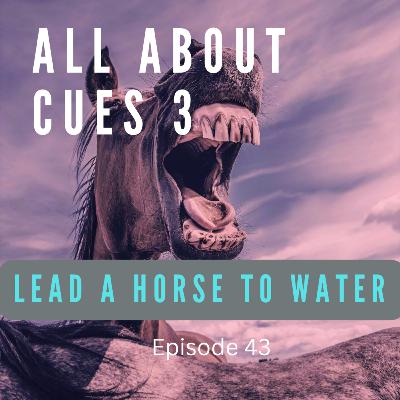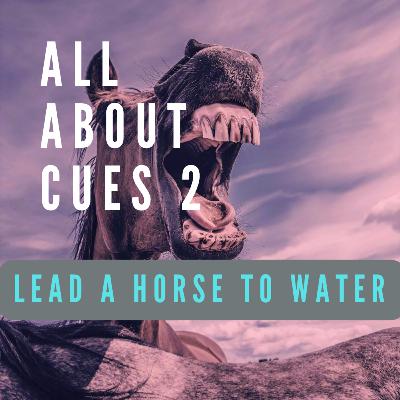Discover Lead a Horse to Water
Lead a Horse to Water

Lead a Horse to Water
Author: Trudi Dempsey
Subscribed: 35Played: 290Subscribe
Share
© Trudi Dempsey
Description
Lost in the sea of horse training?
Step aboard for evidence based equine training and behaviour content.
Listen to professionals and enthusiasts from the world of horse training and behaviour as well as associated areas of the equine world.
Trudi Dempsey is an English equine trainer and behaviour consultant, specialising in positive reinforcement.
Step aboard for evidence based equine training and behaviour content.
Listen to professionals and enthusiasts from the world of horse training and behaviour as well as associated areas of the equine world.
Trudi Dempsey is an English equine trainer and behaviour consultant, specialising in positive reinforcement.
81 Episodes
Reverse
In this, my second Summer Short episode, I consider how we can know if something is awesome or BS and does it matter as long as you and your horse are happy and healthy?
Might be a bit controversial but I opened my mouth and out came me!
Ideas for other Summer Shorts can be emailed trudi@equine.training
In conversation with-Irith Bloom certified professional trainer, behavior consultant and TAGteacher.I hope you enjoy the conversation I had with friend and colleague Irith about training and behaviour including, parallels between horses and dogs and much more. Irith Bloom, author, presenter, trainer, and teacher, owns The Sophisticated Dog, a company that provides both peer-to-peer and trainer-to-pet-family services worldwide, as well as in-person training to select clients in Los Angeles. Along with Dr. Kristina Spaulding, Irith co-founded and is faculty at Carefree Companion, a program that helps people teach greater stress resilience and better emotional regulation to their non-human animal companions. Irith has been training animals since the 1980s and has worked with animals ranging from chickens and rabbits to dogs and horses—not to mention humans. A biologist by training, Irith is fascinated by the science of learning. She is a sought-after presenter at conferences andseminars worldwide, and her writing has been published in countless online outlets, as well as in print media including her book “Your Puppy and You: A step-by-step guide to raising a freak'n awesome dog.” Irith is a CPDT-KSA, CBCC-KA, CDBC, VSPDT, KPA CTP, CSAT, CBATI-KSA, and a Fear Free Certified Practitioner (FFCP - Trainer). She is also certified in TAGteach, a positive-reinforcement method for teaching humans. Irith has a bachelor’s degree in biology from the University of Pennsylvania. She is faculty at both Victoria Stilwell Dog Training Academy and Fenzi Dog Sports Academy, on the Board of Directors of the IAABC Foundation, a member of the Advisory Board for Pets for Vets, Chair Emeritus of the Education Committee of the Association of Professional Dog Trainers (APDT), and a former CCPDT Board Member. She also volunteers for National English Shepherd Rescue. Irith lives in Los Angeles. She is between dogs at the moment, but shares her home with a well-behaved spouse.Courses at https://www.fenzidogsportsacademy.com/people/786-people/faculty/37995-irith-bloomIrith on Facebook https://www.facebook.com/TheSophisticatedDog/
The topic of male horses 'dropping' when training with food (clicker training) has reared its head again- I'm glad because it is a topic we need to consider.
In this short episode I will explain (again) why I don't think we should brush this topic under the carpet!
Warning- I talk about penises in this episode.
If you want help with your horse dropping or over threshold when training with food- get in touch, trudi@equine.training or www.equine.training
I don't always recommend clicker training as a first option when I start working with a new client. Why? Well take a listen as I talk through a specific example and explain ways that I might add some R+ based training without the pressure of the trainer carrying food and having to be great at timing and mechanics.How do I square this with working inside a LIMA framework?As always questions and comments are welcome!Email me at trudi@equine.training
In this episode Dr. Katerina Junghansova (Kate) and I chat about cooperative care for horses. Kate is an equine veterinarian, lifelong equestrian, animal lover, and the founder of an educational project called VetCareTraining. Her mission is to promote safe, and ethical horse handling and training. She is really passionate about equine cooperative care, and she thinks it´s the future of equine health care. In her project, she offers online courses and individual online consultations. She also teaches clinics and seminars focused on helping horse owners, as well as equine professionals, handle horses in an easier, safer, more effective, and more ethical way during daily care, veterinary or husbandry procedures, and other real-life situations.
Find Kate:
Insta
Threads
Facebook
YouTube
In this final short episode on target training I delve a little deeper into how and when I use targets in my training.
Questions? Comments? Drop me a message or email trudi@equine.training
The third (hop back and listen to the first two if you haven't yet) in the clicker training targets mini series.
In this one I discuss when I use targets in my training from cognitive enrichment to training movement.
If you want to learn how to train in this way then join me on my accredited professional trainer course in 2025 https://courses.understandhorses.com/courses/horse-trainer-foundation-certificate
Drop me any questions trudi@equine.training
The second (hop back and listen to the first if you haven't yet) in the clicker training targets mini series.
In this one I discuss planning and setting up the behaviour- essential for all training.
If you want to learn how to train in this way then join me on my accredited professional trainer course in 2025 https://courses.understandhorses.com/courses/horse-trainer-foundation-certificate
Drop me any questions trudi@equine.training
My Understand Horses Trainer's course https://courses.understandhorses.com/courses/horse-trainer-foundation-certificate
My IAABC Foundation course https://iaabcfoundation.org/courses/equine-discomfort-ethogram/
My IAABC Foundation Journal article on targets
https://journal.iaabcfoundation.org/target-training-for-horses-hit-or-miss/
In this episode I talk to Chess about her journey with Gambit her young Exmoor pony. I met them when she needed help with his behaviour and the two have been a real joy to work with.
My new accredited trainer course is now live at Understand Horses
https://courses.understandhorses.com/courses/horse-trainer-foundation-certificate
Check out my IAABC Foundation course here https://iaabcfoundation.org/courses/equine-cooperative-care/
In this episode I am thrilled to talk wild and feral horses with the wonderful Samantha (Sam) Couper PhD. We delve into Sam's back story right up to her present day training with her own horses and her work as a behaviour consultant.
Sam is Board Chair of the Onaqui Catalogue Foundation, a group dedicated to compiling citizen observations of the Onaqui wild horses in Utah, USA, in the pursuit of research and public education. With the foundation, Sam teaches a course on wild horses at the University of Utah three times a year.
Sam ended a career in Materials Science to pursue
education about wild horse behaviour and to become a full time behaviour consultant.
Where to find Samantha Couper PhD:
https://equineabcs.com
https://onaquicatalogue.org
https://www.youtube.com/@onaquiwildhorsesutahusa3122
https://www.facebook.com/equineabcs
https://www.instagram.com/equineabcs
https://www.tiktok.com/@equineabcs
In this episode I chat to Polly Smeath about rope halters and controlling horses when leading.
Polly has an extensive background in the world of
horses, a passion that has woven throughout her life since childhood. Born into
a family with a history of racehorses, Polly's earliest memories include a
vivid encounter with a tall, dark brown horse at the age of two. Her journey as
a "pony mad youngster" began at the age of nine, marked by a
memorable fall from a skewbald pony named Star Trek, who had been rescued with
severe laminitis.
Undeterred by challenges, Polly persevered through early
riding school experiences, determined to regain her confidence and with time
spent at Anne Cory's yard, where she was exposed to her gentle lunging methods
and innovative ideas about fitness regimes Polly flourished and after she
followed the working pupil route at Oldencraig Equestrian Centre and then
received a bursary from the Leonardo Da
Vinci foundation that took her to Denmark for training, an experience that
influenced her deeply despite witnessing some unsettling practices.
Upon returning, Polly, now a mother, started forming her own
opinions on horse care. Throughout her career, she has gravitated towards
rehabilitating horses in need, focusing on understanding and connecting with
them. Today, she primarily works in hoof care, specialising in helping horses
express themselves and be heard, embodying a philosophy of awareness,
lightness, and softness in her approach.
Find Polly via the UK clicker training group on Facebook or get in touch with me and I can put you in touch.
I was thrilled to be able to talk to Dr Eduardo J Fernandez on the podcast. Not only is he an amazing applied behaviour researcher but he is great at putting some of the more technical definitions into easy to understand terminology.
Our discussion centres around training as enrichment but there were also some rabbit holes and side stories that we delved into.
Eduardo J. Fernandez is a Senior
Lecturer of Applied Animal Behaviour and Welfare in the School of Animal and
Veterinary Sciences at the University of Adelaide (Australia). He received his
Ph.D. in Psychology (minors in Neuroscience and Animal Behavior) from Indiana
University, where he worked with the Indianapolis and Cincinnati Zoo. He
received his M.S. in Behavior Analysis from the University of North Texas,
where he founded the Organization for Reinforcement Contingencies with Animals
(ORCA). Most of his past and current work involves behavioral research applied
to the welfare and training of zoo, aquarium, and companion animals. His past positions
include a Visiting Professorship in the Psychology Department at Seattle
Pacific University, a Visiting Professorship in the School of Behavior Analysis
at the Florida Institute of Technology, an Affiliate Assistant Professorship in
the Psychology Department at the University of Washington, a Research
Fellowship with Woodland Park Zoo, and a National Science Foundation
Postdoctoral Fellowship. While working with UW and the Woodland Park Zoo, he
started the Behavioral Enrichment Animal Research (BEAR) group, which conducted
welfare research with many of the species and exhibits located throughout the zoo.
He currently runs the Operant Welfare Lab (OWL), which is dedicated to the use
of learning principles to improve the lives of animals. OWL is also part of the
broader Animal Behaviour, Welfare, and Anthrozoology Lab (ABWAL; abwal.com). Many
of Eduardo’s past publications, research projects, and presentations can be
found on his ResearchGate profile:
https://www.researchgate.net/profile/Eduardo-Fernandez-27
Some of the studies/reviews that we mention can be found below and are open access.
You can contact Dr Fernandez at: eduardo.fernandez@adelaide.edu.au
Fernandez, E. J. (2022). Training as enrichment: A critical
review. Animal Welfare, 31(1), 1-12.
Fernandez, E. J., & Martin, A. L. (2021). Animal
training, environmental enrichment, and animal welfare: A history of behavior
analysis in zoos. Journal of Zoological and Botanical Gardens, 2(4), 531-543.
Fernandez, E. J. (2020). Training petting zoo sheep to act
like petting zoo sheep: An empirical evaluation of response-independent
schedules and shaping with negative reinforcement. Animals, 10(7), 1122.
In this episode I had a fabulous chat with Heather. We had aimed to look at what draws people to more 'glamorous' 'from different world' trainers but it turned into a wonderful introspective (well certainly for me, I hope Heather enjoyed it too).
We ask how to be credible.
What are our insecurities
How to collaborate and build connections.
If you are a trainer, a coach, a consultant, a business woman, a horse lover...this one is for you.
Heather helps horses and people learn to be comfortable with healthcare procedures using positive reinforcement
training. She also help horses and riders with getting started
under saddle, as well as ways to help develop confidence
with riding. In her own words she's a failed traditional horsewoman. She understands traditional skills and methodologies, and how and why they work, but after thirty years working with horses she did not have the kind of success she has now with positive reinforcement training. She have had Fibromyalgia for nearly 40 years. This has given her deep insight into how chronic pain and fatigue affects all aspects of life, for people and animals. It's because of this that she's been drawn to study neuroscience, behavior, biomechanics, and so forth.
Her life experiences with neurodivergence (because, she says, she has a weird brain) and chronic illness have given her some really strong opinions on the one-size-fits-all approach in American culture, and in the equestrian industry in general, particularly with respect to learning.
Heather is on Facebook https://www.facebook.com/equusintegratus
and her website:
https://equusintegratus.com
In this final (for now) episode on cues I look at transferring cues which is great if you want to tidy up your complex cues or change your original cue for something more appropriate.
Please share these short episodes and let me know if you've tried any of my suggestions for improving your cues!
What to choose as a cue?
Physical, verbal, tactile? What is clear, easy to use, easy to replicate?
Rebeccah Baylis is one of my fave students, we talk in this episode about a session that felt quite sticky at the start but ended well. Do you know when it might be acceptable to push on a little further? Should we always stop at the first sign of resistance? It's definitely a training conundrum. Find Becky and our shared events in 2024 at
https://littlegreenstables.com/
Discrimination
Knowing what to do to get reinforced- the best friend of stimulus control (part 3) and discriminative stimulus (part 2).
How can you help your horse know what a cue means?
Please enjoy and share, Trudi
Stimulus Control
In this third short on my continuing theme of cues I'm looking at how 'clean' our cues are. Stimulus control is an essential part of developing cues, it helps us create a clear language that reduces the chances of frustration.
I share the 4 criteria of stimulus control and what we need to consider right from the get go in terms of cues.
What to do when? Does your horse know? Do you think you know what your cues are? Does your horse agree?
This short episode builds on the previous and looks at the idea of a discriminative stimulus- do you know what your SD is and does your horse agree?


